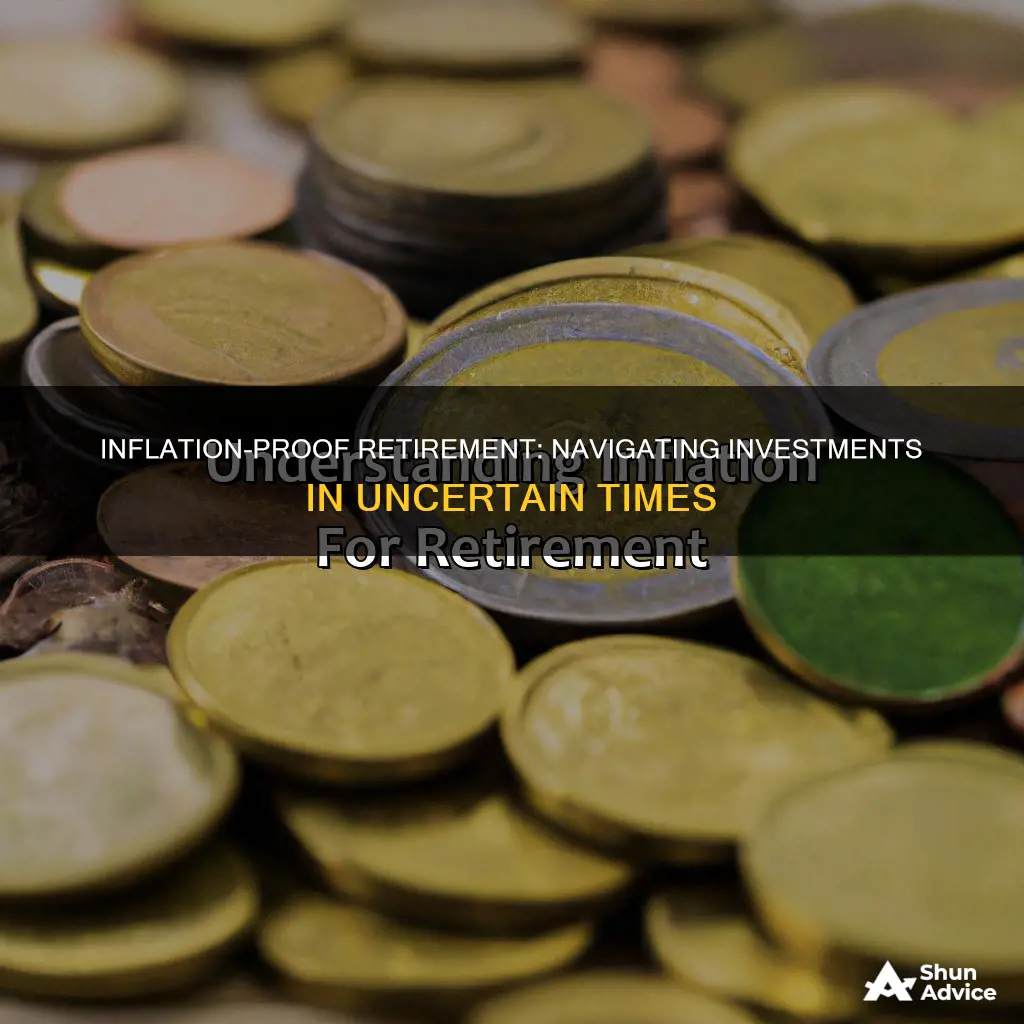
Inflation is a serious concern for retirees and near-retirees, as it can significantly reduce their spending power when living on a fixed income. While it is not possible to control inflation, there are concrete steps that can be taken to mitigate its impact on retirement security. This includes delaying claiming Social Security benefits, investing for growth and rebalancing portfolios, considering annuities, and preparing for future long-term care costs. Diversifying income streams and consulting financial advisors about the proper level of risk are also recommended.
| Characteristics | Values |
|---|---|
| Average annual inflation rate in the U.S. since 1913 | 3.1% |
| Average annual inflation rate by the U.S. Federal Reserve | 2% |
| Ways to beat inflation | Renting out part of your house, Treasury Inflation-Protected Securities (TIPS), fixed annuities, investing in mutual funds, stocks, and ETFs |
| How to deal with inflation in retirement | Delay claiming Social Security benefits, invest for growth and rebalance regularly, consider the role of annuities, prepare for future long-term care costs |
| How inflation impacts retirement income | Devaluation of savings, reduction of income, impact on revenue, savings, and spending |
What You'll Learn

Diversify your portfolio to include inflation-proof stocks and higher-interest bonds
Diversifying your portfolio is a crucial strategy to safeguard your investments during inflation. Here are some ways to diversify your portfolio to include inflation-proof stocks and higher-interest bonds:
Inflation-Proof Stocks:
- Focus on defensive sectors: Invest in utility stocks, consumer staples, and healthcare sectors. These sectors tend to be resilient during inflationary periods or economic downturns as there is steady demand for their products and services. Examples include companies like Procter & Gamble, Walmart, and Merck & Company.
- Look for pricing power: Choose companies that can pass on cost increases to their customers without significantly impacting sales. For instance, Advance Auto Parts benefits from people's need to maintain their vehicles, even when new vehicles become more expensive.
- Invest in commodities and related stocks: During inflation, commodities and the stocks of companies dealing with them often outperform the market. Consider energy companies, precious metal miners, and steelmakers, and exchange-traded funds (ETFs) that track baskets of commodity stocks.
- Focus on essential goods and services: Consumers tend to cut back on discretionary spending during inflation. Therefore, companies providing essential goods and services, such as utilities, consumer staples, and insurance, are more likely to maintain stable demand.
- Strong balance sheets: Seek companies with robust balance sheets, healthy cash flow, and low debt loads. These companies are better equipped to navigate inflationary pressures and high-interest rates without relying heavily on borrowing. Berkshire Hathaway is an excellent example of such a company.
Higher-Interest Bonds:
- Understand the relationship between interest rates and bonds: Interest rates and bond prices are inversely related. When interest rates rise, bond prices tend to fall, and vice versa. This is because investors can get higher yields from newly issued bonds, making existing lower-yielding bonds less attractive.
- Consider short-term bonds: Short-term bonds are less sensitive to interest rate changes than long-term bonds. Additionally, they tend to offer higher yields during inflationary periods.
- Treasury Inflation-Protected Securities (TIPS): TIPS are effective in offsetting inflation risk within your portfolio. They provide a real rate of return that is guaranteed by the U.S. government, protecting your investment from the eroding effect of inflation.
- Diversify your bond holdings: Diversification can help mitigate the impact of interest rate changes and inflation on your bond holdings. Include a mix of short-term and long-term bonds, as well as different types of bonds, such as government, corporate, and municipal bonds.
- Monitor economic indicators: Keep an eye on economic indicators, such as inflation rates, interest rate decisions by central banks, and economic growth data. These factors influence the performance of bonds and can help you time your bond investments accordingly.
Remember, while diversifying your portfolio is essential, it's also crucial to conduct thorough research and consult with a financial advisor before making any investment decisions.
Is Now the Time to Be All In?
You may want to see also

Invest in Treasury Inflation-Protected Securities (TIPS)
Treasury Inflation-Protected Securities, or TIPS, are a type of government-backed bond that was introduced in 1997. They are designed to hedge against rising consumer prices and protect investors against inflation. TIPS are set up so that the principal, or face value, of the bond can increase or decrease in line with inflation or deflation. This is in contrast to other Treasury securities, where the principal is fixed.
The U.S. Treasury sells TIPS for terms of 5, 10, or 30 years. The face value of TIPS is pegged to the Consumer Price Index (CPI) and is adjusted in step with changes in the rate of inflation. The Treasury then pays interest on the adjusted face value of the bond, resulting in a stream of interest payments that gradually rises if inflation continues to increase.
For example, if you invest $1,000 in a new 10-year TIPS with a 2% coupon rate, and inflation is 3% over the next year, the face value will be adjusted to $1,030. The annual interest payment would then be $20.60, or 2% of the adjusted principal. In a deflationary environment, the face value and interest payments would decrease but would still keep pace with the lower cost of goods and services.
TIPS can be an effective portfolio diversification tool as they have a low correlation with other types of investments, potentially reducing overall portfolio volatility. They also do not carry traditional credit risk due to their U.S. government guarantee. However, like all bonds, TIPS are subject to interest rate risk.
You can purchase TIPS directly from the U.S. Treasury for a minimum of $1,000, or through a mutual fund or exchange-traded fund that invests in TIPS.
Crafting a Careful Index Portfolio Strategy for the Retirement Home Stretch
You may want to see also

Put excess cash to work
Excess cash in a time of high inflation is both a blessing and a curse. While it is essential to have money in the bank for emergencies and ongoing spending, cash sitting in your account might be losing value.
Identify True Excess Cash
Before deciding on an amount to invest, ask yourself some significant questions:
- What are your current and future cash requirements?
- Are your liquidity needs matched to your investments?
- What is your ultimate financial goal?
Once you identify cash that is truly excess, think about what you want to use it for and discuss a suitable investment plan with your financial advisor.
Government Bonds
Core European government bonds (issued by the highest-rated euro area sovereigns) are considered among the lowest-risk investments. They are non-complex instruments, typically highly liquid, and available to all investors. In addition, government bonds can demonstrate safe-haven characteristics. For example, in March 2023, government bonds posted positive price performance and outperformed corporate bonds due to safe-haven investor demand. Gross yields of nearly 3.5% are currently available on AAA-rated short-dated euro government bonds.
Safety in Short Duration
Investing in short-duration assets limits the risk sensitivity to unexpected interest rate moves relative to longer-duration (longer maturity) assets. Given the unique backdrop of interest rate markets today, shorter-duration bonds offer higher yields relative to longer-duration bonds of the same issuer. For instance, the German Government two-year bond yield is roughly 0.45% higher than the 10-year bond yield.
Positive-Yielding, High-Grade, Short-Maturity Fixed Income Portfolios
For investors with larger amounts of excess cash who are willing to accept a little more risk, another option is a positive-yielding, high-grade, short-maturity fixed-income portfolio. These portfolios can be constructed using core government bonds, high-quality corporate securities, or a blend of both. This low-risk, conservative blend can generate a gross yield of up to 4.5%.
Blended Investment Portfolios
A blended investment portfolio of equities and bonds is the higher-risk alternative for excess cash. While equities alone are higher risk, a well-balanced investment portfolio has a high probability of keeping its value and adding significant growth over a period of more than five years.
The most important thing is to not underestimate the options available for excess cash. Talk to a financial advisor and consider your objectives and ideal risk tolerance. Small steps today to diversify your wealth will help to avoid capital erosion, grow your money, and preserve your purchasing power.
A Smart Strategy: Investing $400,000 for Retirement
You may want to see also

Invest in stocks, mutual funds, and ETFs
While investing in stocks, mutual funds, and ETFs during inflation is challenging, it can be done successfully. Here are some strategies and options to consider:
Stocks
Stocks have a reasonable chance of keeping up with inflation, but not all perform equally. High-dividend-paying stocks, for example, tend to suffer during inflationary times. Instead, focus on companies that can pass on rising input costs to customers, such as those in the consumer staples sector. These companies produce essential, evergreen products, allowing them to raise prices without significantly impacting demand and preserving profitability.
Mutual Funds
Mutual funds can be an effective hedge against inflation through various strategies. Here are some options to consider:
- Treasury Inflation-Protected Securities (TIPS): TIPS are bonds that adjust their principal value based on inflation. Vanguard offers mutual funds that invest in TIPS, such as Vanguard Treasury Inflation-Protected Securities Investor (VIPSX) and their Admiral shares (VAIPX). While TIPS can perform better during inflation, they still carry interest rate risk.
- Value Stocks: Value stocks tend to outperform growth stocks during inflationary periods and rising interest rates. They often have strong present cash flows that are expected to slow over time. Financial stocks, a type of value stock, can benefit from higher interest rates by increasing the spread between loan rates and deposit account rates. Dodge & Cox Stock (DODGX) is a mutual fund that invests in value stocks, including financial stocks.
- Commodities: Commodities, such as oil, gold, grains, and lumber, are the raw materials used to create goods. As inflation increases the prices of these goods, investing in commodities can be a hedge. Parametric Commodity Strategy Investor (EAPCX) is a mutual fund that invests in a broad basket of commodities.
- Real Estate: Real estate investment trusts (REITs) provide natural protection against inflation as their property values and rents tend to increase alongside consumer prices. REITs are required to distribute at least 90% of their taxable profits as dividends, and these dividends often grow faster than inflation. Vanguard Real Estate Index Admiral (VGSLX) is a mutual fund that invests in REITs.
ETFs
Exchange-traded funds (ETFs) can provide affordable, transparent, and liquid exposure to various inflation-resistant assets. Diversifying across multiple inflation-resistant ETFs can make your portfolio even more resilient. Here are some ETF options to consider:
- Precious Metals: Gold, in particular, can preserve purchasing power, reduce portfolio volatility, and hedge against long-term inflation. Franklin Responsibly Sourced Gold ETF (FGLD) provides exposure to physical gold while also considering environmental and social factors.
- Infrastructure: Physical infrastructure assets, such as transportation, energy, and utilities, can pass on inflationary costs to users. iShares Global Infrastructure ETF (IGF) and FlexShares STOXX Global Broad Infrastructure Index Fund (NFRA) offer diversified exposure to infrastructure-related companies.
- Short-Term TIPS: TIPS are a type of government bond designed to protect against inflation by adjusting their principal value. Vanguard Short-Term Inflation-Protected Securities ETF (VTIP) focuses on short-term TIPS and has a low expense ratio.
- Commodities: Commodities are a direct way to hedge against short-term inflation. Invesco Optimum Yield Diversified Commodity Strategy No K-1 ETF (PDBC) provides synthetic exposure to a broad range of commodities through futures contracts.
- Consumer Staples: The consumer staples sector is relatively resilient to inflation as companies can pass on cost increases to customers without significantly impacting demand. Vanguard Consumer Staples ETF (VDC) invests in a portfolio of consumer staple stocks, including Procter & Gamble Co. (PG) and Coca-Cola Co. (KO).
Tether: The Stablecoin Advantage
You may want to see also

Delay claiming Social Security benefits
Delaying the claiming of Social Security benefits is a strategy that can be employed to manage the impact of inflation on retirement savings. Social Security benefits are a form of fixed income that is adjusted for inflation through cost-of-living increases (COLAs). Delaying retirement and claiming Social Security benefits at an older age can result in higher monthly payments. Here are some key considerations regarding this strategy:
- Understanding Delayed Retirement Credits: Social Security retirement benefits increase by a certain percentage for each month an individual delays starting their benefits beyond their full retirement age, up to the age of 70. This is known as Delayed Retirement Credits. The specific increase varies depending on the year of birth and the age at which benefits are claimed.
- Impact on Monthly Payments: By delaying retirement, individuals can boost their monthly Social Security payments. For example, those who wait until age 70 to collect Social Security can increase their monthly payments by up to 8%. This can provide a higher baseline income during retirement, which is beneficial in the face of inflation.
- Full Retirement Age: It's important to understand the full retirement age, as it is the reference point for calculating Delayed Retirement Credits. The full retirement age varies depending on the year of birth. For individuals born in 1938, the full retirement age is 65 years and 2 months, gradually increasing by 2-month intervals until it reaches 67 years for those born in 1960 or later.
- Working During Retirement: Delaying Social Security benefits doesn't necessarily mean complete retirement. Individuals can continue working part-time or in a new industry during this period, earning an income that can supplement their savings and delay the need to draw from retirement funds.
- Impact on Medicare: When considering delaying retirement, it's important to sign up for Medicare at age 65. Failing to do so may result in delayed Medicare coverage and increased costs.
- Online Calculators: The Social Security Administration provides online calculators to estimate the impact of delaying retirement on benefit amounts. These tools can help individuals make informed decisions about when to start claiming benefits.
- Personal Circumstances: The decision to delay claiming Social Security benefits depends on various factors, including health, life expectancy, and current income sources. It is a personal choice that should consider an individual's unique situation.
Shiba Investors: A Community's Power
You may want to see also
Frequently asked questions
Diversifying your portfolio is one of the most widely accepted ways to maintain its value. Diversification can help balance out losses from stocks or other assets that lose value during rising inflation. Commodities, bonds, and inflation-protected investments are also traditional hedges against inflation.
Some investments that tend to fare well during inflation include commodities, inflation-indexed bonds, Treasury Inflation-Protected Securities (TIPS), and consumer staples.
Inflation can seriously devalue your savings and reduce your income. Over time, it can reduce your spending power when you're living on a fixed income.







